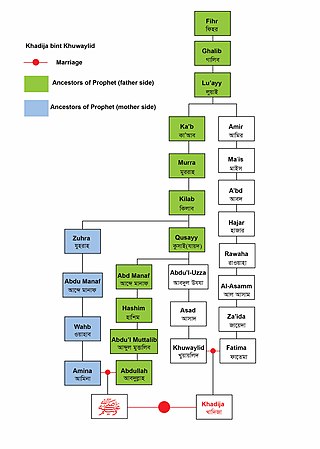Abdullah ibn Abd al-Muttalib was the father of the Islamic prophet Muhammad. He was the son of Abd al-Muttalib ibn Hashim and Fatima bint Amr of the Makhzum Clan.
Fatima bint Asad was the wife of Abu Talib and the mother of their son Ali ibn Abi Talib.
Arwā bint Ḥarb, better known as Umm Jamīl, was an aunt of the Islamic prophet Muhammad who is mentioned in the Quran. She was Abu Lahab's wife and Abu Sufyan's sister. Arwa is usually remembered for opposing Islam and the prophet, and also for a poem.
Abū ‘Abd Allāh Muḥammad ibn Sa‘d ibn Manī‘ al-Baṣrī al-Hāshimī or simply Ibn Sa'd and nicknamed Scribe of Waqidi, was a scholar and Arabian biographer. Ibn Sa'd was born in 784/785 CE and died on 16 February 845 CE. Ibn Sa'd was from Basra, but lived mostly in Baghdad, hence the nisba al-Basri and al-Baghdadi respectively. He is said to have died at the age of 62 in Baghdad and was buried in the cemetery of the Syrian gate.

Khadijah bint Khuwaylid was the first wife and the first follower of the Islamic prophet Muhammad. Khadija was the daughter of Khuwaylid ibn Asad, a noble of the Quraysh tribe in Makkah and a successful merchant.
The raid on Amarr, also known as the Raid on Ghatafan, occurred directly after the Invasion of Sawiq in the year A.H. 3 of the Islamic calendar, March 625. The expedition was ordered by Muhammad after he received intelligence that the Banu Muharib and Banu Thalabah tribes were planning to raid the outskirts of Madinah. Therefore, Muhammad launched a pre-emptive strike with 450 men.
The Expedition of Muhammad ibn Maslamah took place in July, 627 AD in Muharram, 6AH.
Expedition of Fadak, also spelt Fidak, took place in December, 627AD, 6AH, 8th month of the Islamic Calendar
Expedition of Ghalib ibn Abdullah al-Laithi to Mayfah took place in January 628 AD, 9th Month 7AH, of the Islamic Calendar.
Expedition of Ghalib ibn Abdullah al-Laithi to Fadak took place in January 629 AD, 10th Month 7AH, of the Islamic Calendar.
Expedition of Abi Hadrad al-Aslami, took place in January 629 AD, 7AH, Shawwal of the Islamic Calendar. In this expedition, the chief of the Banu Jusham tribe Rifa'a ibn Qays was successfully assassinated.
Raid of Sa'd ibn Zaid al-Ashhali, took place in January 630 AD, 8AH, 9th month, of the Islamic Calendar, in the vicinity of al-Mushallal. Sa'd ibn Zaid al-Ashhali was sent to demolish the images of the gods worshipped by the polytheist tribes around the area.
Expedition of Khalid ibn al-Walid, to Mecca, against Banu Jadhimah, took place in January 630 AD, 8AH, 9th month, of the Islamic Calendar.
The Expedition of Qutbah ibn Amir, against the Khath'am tribe, took place in August 630 AD, 9AH, 2nd month, of the Islamic Calendar.
The Expedition of Dahhak al-Kilabi, against the Banu Kilab tribe, took place in August 630 AD, 9AH, 2nd month, of the Islamic Calendar. When the Muslims arrived, brief fighting took place, and the Banu Kilab fled. Al-Asyad then captured his father, and held him until he could get support from another Muslim, who then killed his father.
The Expedition of Alqammah bin Mujazziz, took place in September 630. This expedition was dispatched to fight against some men from the Kingdom of Aksum, who gathered near the shores of Jeddah. The Ethiopians approached Mecca using boats from the sea, leading some Muslims to flee the area, suspecting the Ethiopians of being pirates.
The Expedition of Ali ibn Abi Talib, against the Banu Tai tribe, took place in August 630 AD, 9AH, second month, of the Islamic Calendar. to destroy the statue (idol) of the pagan deity al-Fuls (al-Qullus).
The Expedition of Ukasha bin Al-Mihsan, against the tribes of Udhrah and Baliy, took place in October 630 AD, 9 AH of the Islamic Calendar.
This is a timeline of the early history of Islam during the lifetime of Muhammad. The information provided in this article is based on Islamic oral tradition, not on historical or archaeological evidence. A separate list of military expeditions and battles is at List of expeditions of Muhammad.

Raid on al-Ghabah was a military expedition of the Islamic Prophet Muhammad that took place in 6AH of the Islamic calendar. No orders given by Muhammad in this expedition but Amr ibn al-Akwa attacks Uyanah bin Hisn Al-Fazari after seeing him seize 20 of Muhammad's camels. One Muslim shepherd was killed, and his wife captured.

